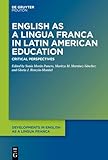English as a Lingua Franca in Latin American Education : Critical Perspectives / ed. by Maritza M. Martínez-Sánchez, Sonia Morán Panero, Gloria J. Ronzón-Montiel.
Material type: TextSeries: Developments in English as a Lingua Franca [DELF] ; 17Publisher: Berlin ; Boston : De Gruyter Mouton, [2024]Copyright date: 2024Description: 1 online resource (XIV, 273 p.)Content type:
TextSeries: Developments in English as a Lingua Franca [DELF] ; 17Publisher: Berlin ; Boston : De Gruyter Mouton, [2024]Copyright date: 2024Description: 1 online resource (XIV, 273 p.)Content type: - 9783110750881
- 9783110751000
- 9783110750966
- English language -- Globalization
- English language -- Study and teaching -- Foreign speakers
- English language -- Study and teaching -- Latin America
- Lingua francas -- Latin America
- Englischunterricht
- Lateinamerika
- Lingua Franca
- Sprachpolitik
- LANGUAGE ARTS & DISCIPLINES / Linguistics / General
- English Language Teaching
- English as a Lingua Franca
- Language Policy
- Latin America
- 420.71/18 23//eng/20241014eng
- online - DeGruyter
- Issued also in print.
| Item type | Current library | Call number | URL | Status | Notes | Barcode | |
|---|---|---|---|---|---|---|---|
 eBook
eBook
|
Biblioteca "Angelicum" Pont. Univ. S.Tommaso d'Aquino Nuvola online | online - DeGruyter (Browse shelf(Opens below)) | Online access | Not for loan (Accesso limitato) | Accesso per gli utenti autorizzati / Access for authorized users | (dgr)9783110750966 |
Frontmatter -- Acknowledgements -- Contents -- List of tables -- List of figures -- Acronyms -- Chapter 1 Understanding English as a Lingua Franca in Latin America: Aims and points of departure -- Chapter 2 English as a Lingua Franca curriculum from a decolonial perspective -- Chapter 3 “British English is much more prestigious, everybody knows that!”: Reproducing and resisting hegemonic language ideologies in Chilean English teacher education -- Chapter 4 Introducing ELF-aware teacher education in Colombia: Voices of in-service teachers pursuing graduate studies -- Chapter 5 Metalanguaging ELF: The transformational power of students’ critical dialogic talk -- Chapter 6 Is there empowerment through ELF? Insights from the experience of Brazilian student-teachers -- Chapter 7 Interactional Pragmatics Strategies (IPS) in spoken communication: Are business language courses in the Mexican Caribbean preparing students for (B)ELF? -- Chapter 8 English language teachers’ understandings of English as an International Language or Global Lingua Franca: Comparative perspectives from Argentina, Venezuela and Ecuador -- Chapter 9 A good match for diversity and inclusion? ELF and English teaching aspirations in Mexican Higher Education -- Chapter 10 Looking back, forward, within and across -- Notes on contributors -- Index
restricted access online access with authorization star
http://purl.org/coar/access_right/c_16ec
ELF researchers have been describing the dynamic and fluid ways in which multilingual speakers shape English in transcultural communication for more than two decades now. While this work seriously challenges traditional, static, and prejudiced views of English, the diverse and variable nature of its uses and users continues to be undermined in many EFL programs around the world. This is also the case in many Latin American contexts, which have been described as fertile ground for native-speaker ideology, but where the body of ELF literature is still scarce when compared to Asian and European settings. This book is the first to bring together a series of empirical studies on the implications of ELF perspectives for communicative, educational, and policy-making practices across different Latin American countries. It not only explores how ELF perspectives can inform students and educators in these settings, but also how locally emerging voices, experiences, and research traditions can help expand ELF theorising as well. The volume generates new opportunities for dialogue and global collaboration between researchers and practitioners interested in ELF studies as a critical approach to English language use and education.
Issued also in print.
Mode of access: Internet via World Wide Web.
In English.
Description based on online resource; title from PDF title page (publisher's Web site, viewed 20. Nov 2024)


